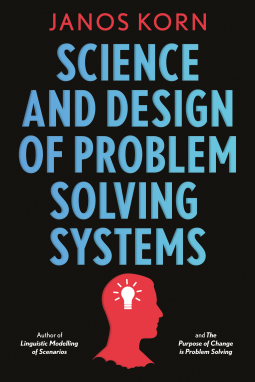
Science and Design of Problem Solving Systems
by Janos Korn
This title was previously available on NetGalley and is now archived.
Send NetGalley books directly to your Kindle or Kindle app
1
To read on a Kindle or Kindle app, please add kindle@netgalley.com as an approved email address to receive files in your Amazon account. Click here for step-by-step instructions.
2
Also find your Kindle email address within your Amazon account, and enter it here.
Pub Date Nov 18 2022 | Archive Date Dec 06 2022
Talking about this book? Use #ScienceandDesignofProblemSolvingSystems #NetGalley. More hashtag tips!
Description
The book is about an empirical, systems theory of a general, systemic/structural view of parts of the world integrated with creative problem solving procedure with the latter generating a ‘product and systems’ design method. As an alternative to the speculative and fragmented nature of current ‘systems thinking’ and practice, the book proposes three principles of systems: ‘Generality/nested hierarchy, changes of equilibrium states and problem solving/purpose’ together with ‘linguistic modelling’ using processed, natural language or transformation of narratives of scenarios into sequences of logical conditionals, the executor of the principles. Implementation of the creative, innovative, inspirational stage leads to ‘design parameters’ which guide the detailed design of systems and products defined as any entity capable of generating interaction. Uncertainties and mathematical models are introduced at the object/agent level as required. The theory is ‘property driven’ i.e., uses qualitative, quantitative properties including social, emotive and other mental states. Elementary, systemic or structural properties are ‘1 - and 2 – place simple sentences’ which can lead to operational representations when appropriate. Meaning preserving, linguistic transformations convert a narrative or story into such sentences. A user driven approach to the analysis of ‘information’ is introduced. Recent paradigm changes and problematic issues in current ‘systems thinking’ are reviewed. The theory is based on accepted branches of knowledge such as linguistics, network theory, biology, physics, chemistry, social science as needed, it is highly teachable, introduces linguistics in addition to mathematics as a symbolic model and can inspire further research. It introduces four criteria for judging the ‘soundness’ of symbolic models. However, it needs peer review, software development to work out the dynamics of scenarios and further developments for applications to more practical problem situations in organisations, technical and natural circumstances.
A Note From the Publisher
Available Editions
| EDITION | Ebook |
| ISBN | 9781803134253 |
| PRICE | £8.99 (GBP) |
| PAGES | 368 |



